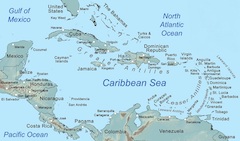
Caribbean Sea. A tropical sea of the Atlantic Ocean, bordered by the Greater Antilles to the north, the Lesser Antilles to the east, South America to the south, and Central America to the west. It covers approximately 2.754 million km² (1.063 million mi²) and is known for its warm waters, diverse marine life, and historical significance in global trade, exploration, and culture.
Geography and Location
The Caribbean Sea is connected to the Atlantic Ocean via the Windward Passage, the Mona Passage, and the Anegada Passage, while the Yucatán Channel links it to the Gulf of Mexico. Major water bodies within the Caribbean include the Gulf of Venezuela, Gulf of Darién, and the Honduran Shelf.
The deepest point in the Caribbean Sea is the Cayman Trench, reaching 7,686 meters (25,217 feet). The sea is known for its crystal-clear waters, extensive coral reefs, and thousands of islands, cays, and atolls that form the Caribbean Archipelago.
Climate and Marine Life
The Caribbean Sea has a tropical maritime climate, with warm temperatures year-round. It is prone to hurricanes, particularly from June to November. The warm waters support diverse ecosystems, including the Mesoamerican Barrier Reef (the second-largest barrier reef in the world), mangroves, and seagrass beds.
Marine biodiversity includes:
- Coral reefs with over 500 species of fish
- Sea turtles, such as the hawksbill and leatherback
- Whales and dolphins, including humpback whales
- Sharks and rays, such as nurse sharks and manta rays
Historical Significance
The Caribbean Sea has played a major role in global history, from early indigenous civilizations, such as the Taíno and Carib, to European colonization, the transatlantic slave trade, and piracy during the 17th and 18th centuries. It was a key battleground for colonial powers such as Spain, Britain, France, and the Netherlands.
Economic and Cultural Importance
- Tourism: A major economic driver, with millions visiting destinations like Jamaica, the Bahamas, and the Dominican Republic.
- Fishing and Trade: The Caribbean Sea is a vital route for international shipping, with key ports in Panama, Trinidad and Tobago, and Puerto Rico.
- Energy Resources: Offshore oil and gas reserves are found in nations like Venezuela, Mexico, and Trinidad and Tobago.
- Cultural Influence: The region has contributed to music (reggae, calypso, salsa), cuisine (jerk, seafood dishes), and literature.
Environmental Challenges
The Caribbean Sea faces environmental threats, including:
- Overfishing and pollution
- Climate change and rising sea levels
- Coral bleaching due to warming waters
- Hurricane damage